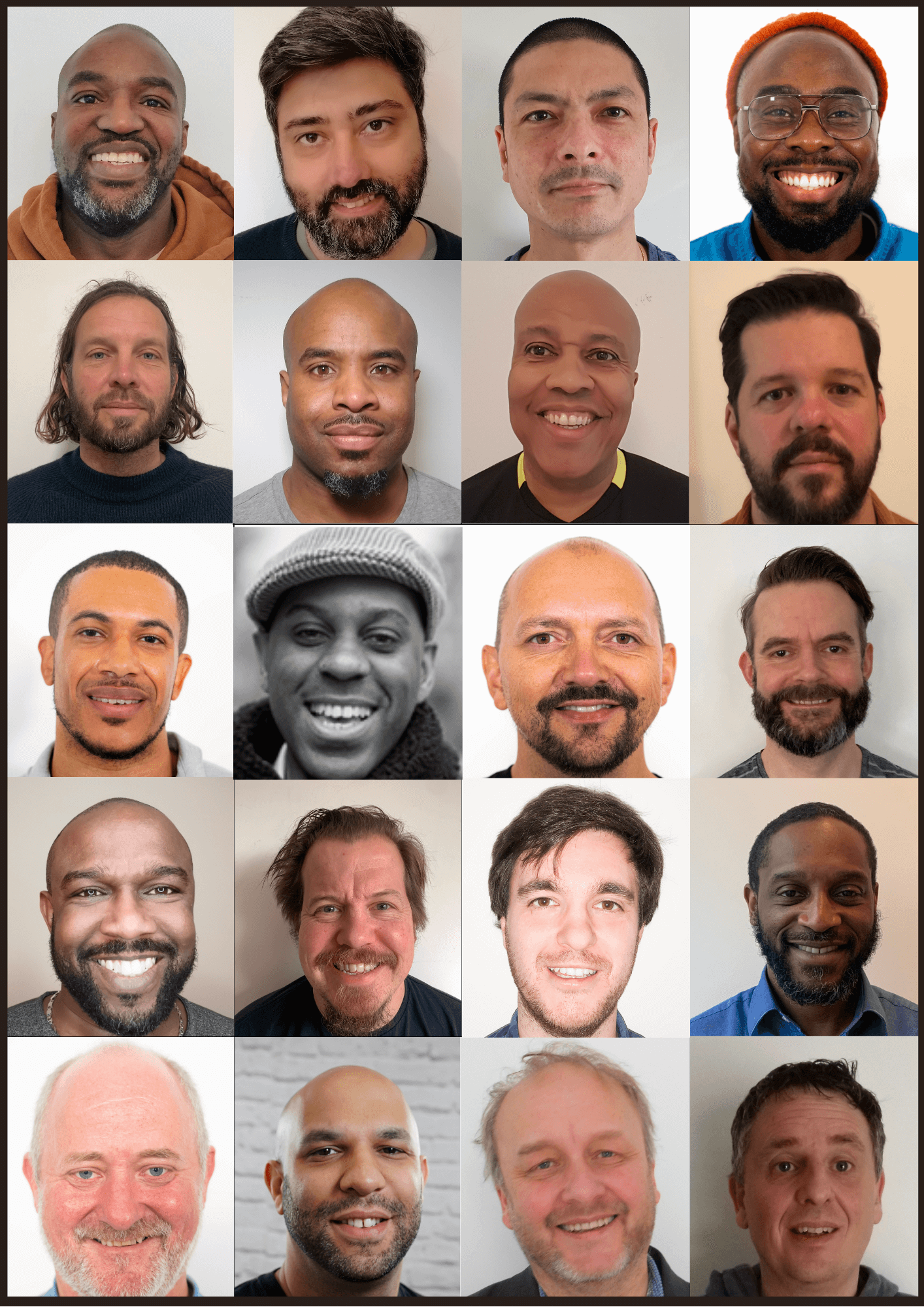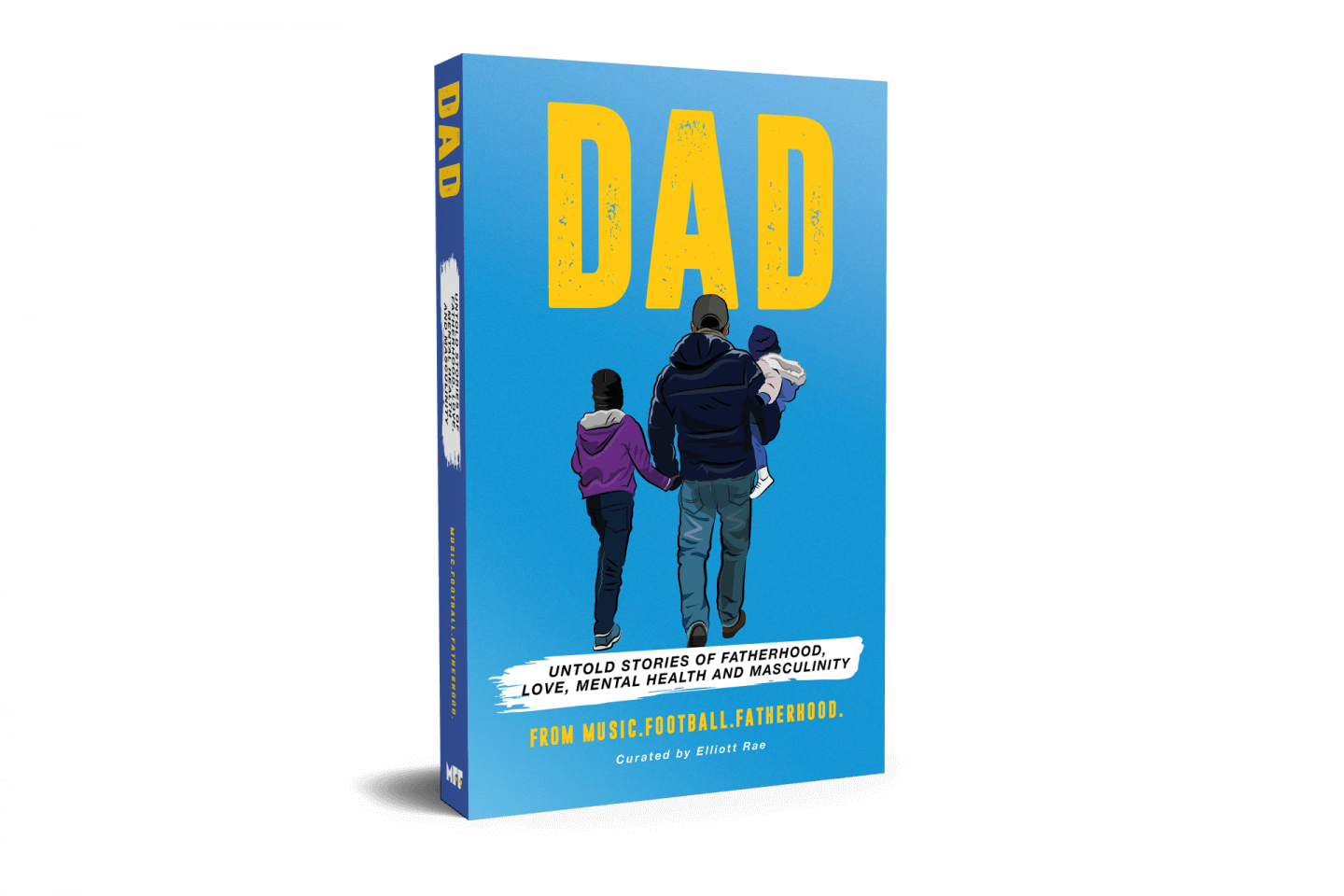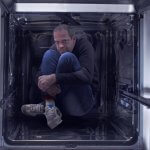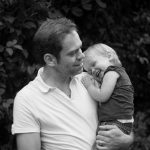Dad: Untold stories of fatherhood, love, mental health and masculinity is a book that has arrived with a lot of fanfare. So what is this book and what’s all the excitement about? It’s a compilation of stories from dads with a variety of backgrounds and each man has a very different story to tell, showing that fathers are not the two dimensional figures you usually see portrayed in popular media.

The stories were complied by Elliott Rae, a well-known diversity specialist whose efforts have been recognised by the United Nations. Using his background and knowledge, the book has indeed attracted a diverse array of contributors from every class, different races, straight, gay and so on.
Of course Rae is also the man who founded the Music Football Fatherhood (MFF) support group and website for dads and Dad has been published under the MFF banner. Interestingly, MFF tried to get a publisher to back this project but the team’s attempts were unsuccessful. Undeterred, MFF went down the crowdfunding route and raised the funds at staggering speed (publishers take note: Yet again you’re missing out on ‘dad bucks’!).
Enough about the background. Let me tell you what’s between the covers.
Diverse collection of 20 stories
A look at the contents of Dad was fascinating. There was a collection of 20 stories from different contributors, each one getting a pen portrait towards the end of the book.
Dad kicks off with an introduction from Rae, in which he talks about the reasons he founded Music Football Fatherhood and how fatherhood and the role of fathers has changed in recent years. He says there is a need for dads to receive more support and states, quite rightly in my opinion, that we need greater gender equality in the home as well as at work. He finishes by calling on the reader to contribute to the conversation on fatherhood, be that with dads you know, friends, colleagues or on social media (Hint: Take a look at the hashtag #WeAreDad).
The book successfully reflects the truly diverse array of men who are fathers. With 20 contributors I won’t talk about each one. Nonetheless, I’ll give you a few highlights.
The mental health campaigner
There is a great contribution from well-known mental health campaigner Mark Williams. Williams, who comes from a family of Welsh coalminers, starts by telling the story of his idyllic childhood, a childhood that was impacted heavily by the mine closures in the 1980s. Moving on from his childhood, Williams takes us through the 1990s and admits he hit the bottle during this time to mask the anxiety he was experiencing.
Eventually he meets his wife, Michelle. Children follow but Williams and his wife both experience depression and he has other conditions diagnosed on top of this. This was the catalyst for Mark’s work in perinatal mental health for which he has a formidable reputation. Not only does Mark feature in this book, but his life story will soon feature in an Amazon Prime original (Which Williams spoke about in this episode of my DadPodUK podcast).
Faith and fatherhood
Moving on, I found it very refreshing to read Cal-I Jonel’s thoughts on how his Christian faith has inspired him and how he sees his role as a leader within his family (equally with his wife, I should add). Few people are prepared to openly talk about faith and so Jonel’s story stood out for this reason. It was also interesting to read of Jonel’s early experiences of moving schools and how he struggled to find his identity knowing that, being black, he was in a minority.
Growing up without a dad
R.P. Falconer’s contribution was a tough read. He describes growing up without a dad and the impact this had on him. His mother had worked very hard to provide for him and his sister and arranged for men, including his grandfather, to be present and fill the void left by his father (the sex education discussion R.P. had with a family friend is a light-hearted moment in an otherwise harsh story).
Nonetheless, he disappoints his mother by totally messing up his GCSEs. It’s a wake-up call and he goes on to retake his GCSES before studying at university, eventually marrying and having children with his childhood sweetheart.
Falconer’s story isn’t a linear fairytale, it’s a rollercoaster. He admits to treating his wife poorly in the early days of their relationship. He also admits to being too harsh on his own son when he was very young, both of which he acknowledges were wrong. Falconer attributes his behaviour to the lack of father and positive male role models in his life.

The stepfather
Saffa Kallon’s story of being a stepfather to Micah appealed to me. to As a stepson myself, I am always keen on reading about stepfamilies. It’s a very honest account in which he admits he loves his natural daughter and stepson differently but equally.
It was also fascinating to read how he and Micah’s biological father get on. Kallon, who himself is a stepson, admitted it was difficult at first but over time they’ve developed a very positive relationship.
Stay at home dad
I approached Sam Draper’s contribution with a certain sense of trepidation because of its title: Equal parenting and shared parental leave: The challenges and benefits of being a stay at home dad.
Why the trepidation? Well, I’ve noticed an odd trend among men who take two or three months of shared parental leave. Some of these guys have taken to referring to themselves as ‘stay at home dads’ before returning to the workplace full time. I wholly support fathers taking shared parental leave and any father who takes a protracted period of leave is clearly very committed and hands-on. Three months experience of this lifestyle, however, does not a stay at home dad make. I was a bit concerned Draper fell into this category.
As I read Draper’s contribution, my trepidation quickly evaporated. He is one of the few men who, like myself, gave up careers to focus on family and home while his partner brings in most of the income. I also noticed some staggering similarities with my own background. Draper and his wife were a bit older than most when they became parents (tick), his wife had the greater earning potential (tick) and having had the one child and settled into becoming their main carer, he started his own business that he fits around family life (tick).
The reality is most stay at home parents have some way of financially contributing to the family. It was great to see a man writing about childcare while also earning and how he balances these competing priorities. If he were a woman, Draper would have to tolerate being labelled a mumpreneur.
Anyway, Draper takes us through the lived reality of being a stay at home dad to two young kids. The silly comments at baby and toddler groups, the insensitive comments from older family members and so on. Interestingly, he goes into great detail about the technical aspects of shared parental leave and also talks, albeit briefly, about the finances of his situation, even mentioning his old workplace pension.
That may sound like an odd thing to write about in a book of this nature, but it’s significant! Take it from someone who knows, when you get asked questions about being a stay at home dad, the questions are frequently about nappy changes and who gets up in the night if the kids call out for a parent. What few people even consider is the impact on retirement planning or your financial future.
I’m not sure this was Draper’s intention, but it was an incredibly shrewd move by Draper to mention this aspect of SAHD life because no one else is discussing these issues. While I started reading this chapter with trepidation, it turned out to be one of my favourites because it was so refreshing.
A superb mix of stories
As I said, I can’t list each and every contributor, but this is a superb mix of stories. Other contributors tell stories about raising children of mixed heritage, having a child with autism, raising a family when you are a widower and so on. I thoroughly recommend reading it for an honest insight into the incredibly diverse world of fatherhood. I should also add the book concludes by highlighting various places that the reader can go to for support and advice regarding fatherhood, relationships and parenting more generally.
If I were to make one comment, it’s that the book does have a bit of a bias towards dads with young children. The challenges I deal with raising a tween on the cusp of her teenage years are very different from those I faced a decade ago. I’ve had to deal with screen time issues, online bullying, starting secondary school, self-harming and runaway attempts (among friends of my daughters’ I should clarify) and so on.
Then again, this book reflects its era. As Rae (another guest on DadPodUK) said in his introduction, the conversation about fatherhood has changed significantly over the past ten years. If we go back a decade, these conversations weren’t even happening so it’s no surprise most of the contributors to Dad have younger kids. It also leaves space for a follow up book looking at the challenges faced by dads with older children.
Rae and MFF are to be applauded for producing Dad. It demonstrates that dads are very diverse characters from equally diverse backgrounds. I’ve got to this point without even mentioning the M word: Masculinity. All too often associated with negative behaviour traits, this book shows beyond doubt that masculine men can be incredible thoughtful, considered caregivers. I hope Dad goes some way to showing the world that fathers are not distant, foolish or uninterested in their kids. The men in this book regularly highlight their flaws demonstrating that, like mums, they are imperfect. Nonetheless, they are deeply caring, committed and trying to do the best for their children no matter what their circumstances.
Dad: Untold stories of fatherhood, love, mental health and masculinity curated by Elliott Rae and published by Music Football Fatherhood is on general release from 1 June, 2021. It is available in hardback with a cover price of £18.99. Further information can be found online on the Music Football Fatherhood website.






